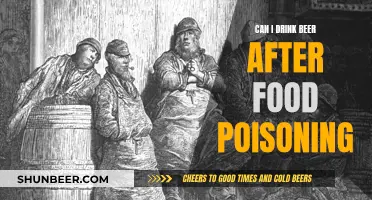
Alcohol is a toxin that can cause dehydration, electrolyte imbalance, and inflammation in the body. It can also disrupt calcium absorption and protein synthesis, both of which are essential for muscle function and development. This can lead to muscle pain, weakness, and in more severe cases, a condition called alcoholic myopathy, which affects about one-third of people with alcoholism.
Alcoholic myopathy can be acute or chronic. Acute alcoholic myopathy occurs after binge drinking and can lead to rhabdomyolysis, a potentially life-threatening condition where muscle tissue breaks down and releases into the blood. Chronic alcoholic myopathy develops over time with regular alcohol consumption and can lead to long-term muscle weakness and other complications.
In addition, alcohol can also contribute to muscle spasms and cramps, especially in older individuals. A study found a strong association between the consumption of alcoholic beverages and nocturnal leg cramps in patients over 60 years old.
Therefore, it is important to consider the potential impact of alcohol consumption on muscle health and to seek medical advice if any muscle-related issues are experienced.
| Characteristics | Values |
|---|---|
| Can drinking beer cause muscle spasms? | Yes |
| What is alcoholic myopathy? | A muscle condition that can affect people with alcoholism or binge drinkers |
| What causes alcoholic myopathy? | Long-term or heavy drinking |
| What are the two types of alcoholic myopathy? | Acute and chronic |
| What is acute alcoholic myopathy? | A condition that happens after binge drinking 4 to 5 alcoholic drinks that cause a blood alcohol level of 0.08 grams per deciliter or more |
| Can acute alcoholic myopathy be life-threatening? | Yes, it can lead to rhabdomyolysis, which can cause kidney failure |
| What is chronic alcoholic myopathy? | A type of muscle condition linked to a lifetime of drinking high amounts of alcohol |
| What are the effects of chronic alcoholic myopathy? | Tissue damage and deficiencies in B vitamins, iron, zinc, potassium, and vitamin D |
| What are the symptoms of alcoholic myopathy? | Muscle pain, fatigue, lightheadedness, weakness, dark urine, cramping, twitching, muscle tightness, sensitivity to heat, and a decrease in muscle mass |
| What are the complications of alcoholic myopathy? | Cardiomyopathy, kidney failure, and deficiency in mineral salts |
| What is the treatment for alcoholic myopathy? | Stop drinking alcohol, vitamins and electrolytes, behavioural therapy and counselling |
| How long do alcoholic myopathy effects last? | About 85% of people recover within 2 to 12 months of quitting all alcohol and are fully recovered within 5 years of sobriety |
What You'll Learn
- Alcohol is a toxin that can cause dehydration, an electrolyte imbalance, and inflammation
- Alcohol interrupts calcium absorption, inhibiting muscle growth and recovery
- Alcohol reduces insulin production, limiting the absorption of carbohydrates into the muscles
- Alcohol is a diuretic, which can lead to dehydration and muscle weakness
- Alcoholic myopathy can cause permanent damage to the nervous system and other parts of the body

Alcohol is a toxin that can cause dehydration, an electrolyte imbalance, and inflammation
Drinking alcohol can lead to dehydration because it is a diuretic, which means it increases the production of urine. Dehydration can cause muscle spasms and cramps, and it can also make the body feel weak. Alcohol also disrupts the flow of calcium in muscle cells, which can lead to reduced strength.
Alcohol can also cause an electrolyte imbalance, specifically of calcium, which is necessary for muscle contractions. In addition, alcohol inhibits protein synthesis, a process that builds muscle, and induces insulin resistance, which impairs muscle development and recovery.
Alcohol further contributes to inflammation in the body. It is broken down into toxic metabolites, which can cause harm. Alcohol also causes oxidative stress, which happens when there is an excess of free radicals that damage tissue and lower the natural compounds that protect the body from this damage. This oxidative stress can cause problems with muscle contractions, leading to weakness.
The effects of alcohol on the body can be both short-term and long-term. Short-term effects include poor athletic performance, which is often linked to hangovers. However, these problems can become more serious and persistent with frequent heavy drinking. Long-term effects include alcoholic myopathy, which can happen suddenly after binge drinking or develop over time with regular alcohol consumption. Alcoholic myopathy causes a loss of function and strength in skeletal muscles.
Beer and Noom: What's the Verdict?
You may want to see also

Alcohol interrupts calcium absorption, inhibiting muscle growth and recovery
Alcohol is a toxin that can have both short-term and long-term effects on your muscles. Drinking alcohol has been shown to harm the muscular system by disrupting muscle growth and recovery.
Calcium is a substance that the body produces to help muscles contract. Drinking alcohol interrupts the flow of calcium in the muscle cells, which is why drinking may reduce your strength. Calcium is essential for maintaining strong bones as well as for muscle and nerve functioning. Calcium levels in the blood do not normally fluctuate but remain within a narrow range. Alcohol intake can impact the amount of calcium absorbed and stored in the bones.
Heavy chronic alcohol intake affects calcium levels in several ways. Firstly, a damaged liver doesn't produce the enzyme needed to convert vitamin D to its active form, and vitamin D is necessary for calcium absorption. Secondly, many heavy drinkers don't absorb fat well, and fat is necessary for calcium and vitamin D absorption.
Alcohol may also eventually interfere with the immune system in ways that affect bone health. Drinking alcohol regularly has been associated with a higher risk of nutrient deficiencies due to poor dietary intake and interrupted nutrient absorption. This includes vitamin A, zinc, and B vitamins like folate, and nutrients more heavily involved in bone health like calcium, vitamin D, and magnesium.
The only proven remedy for muscle pain from alcohol is to reduce or stop drinking. In most cases, quitting drinking alcohol can help reverse the effects of alcoholic myopathy.
Non-Alcoholic Beer: Healthy or Harmful?
You may want to see also

Alcohol reduces insulin production, limiting the absorption of carbohydrates into the muscles
Alcohol reduces insulin production, which limits the absorption of carbohydrates into the muscles. This is due to the fact that insulin is a stimulator of muscle growth and is responsible for the absorption of carbohydrates into muscles. When alcohol is consumed, it limits the absorption ability, impairing muscle development and recovery.
Alcohol is quickly broken down into ethanol, an extremely toxic by-product. The body's main priority after alcohol consumption is to metabolize the ethanol into other less harmful by-products. However, alcohol metabolism disrupts other metabolic pathways that are also responsible for energy production. To digest and break down carbohydrates and fats for energy, certain molecules are required. Alcohol limits the body's ability to burn carbohydrates and fatty acids because it hogs these molecules and decreases their availability to do other things.
Alcohol also reduces insulin resistance, which is a stimulator of muscle growth. Insulin is a potent stimulator of muscle growth and is responsible for the absorption of carbohydrates into muscles. With limited absorption ability, muscle growth and recovery are impaired.
Beer and Crohn's Disease: What You Need to Know
You may want to see also

Alcohol is a diuretic, which can lead to dehydration and muscle weakness
Alcohol is a diuretic, which means it increases urine production and can lead to dehydration. Dehydration can cause muscle weakness and spasms.
Alcohol can also contribute to dehydration by disrupting the body's calcium absorption. Calcium is essential for muscle contractions, and when alcohol interrupts its flow in the muscle cells, it can lead to reduced strength and increased muscle problems.
In addition to dehydration, alcohol can also cause an electrolyte imbalance in the body, further contributing to muscle spasms and discomfort.
The effects of alcohol on the body's calcium absorption and electrolyte balance can be short-term, often associated with hangovers. However, these problems can become more serious and persistent with frequent heavy drinking.
To prevent dehydration and its associated muscle weakness, it is important to stay hydrated by drinking plenty of water, especially when consuming alcohol.
Boxer Dogs and Beer: What's the Verdict?
You may want to see also

Alcoholic myopathy can cause permanent damage to the nervous system and other parts of the body
The condition can develop suddenly after binge drinking or over time with regular alcohol use. It is estimated that one-third of people with alcoholism will develop alcoholic myopathy. It is more common in people with other alcohol-related diseases, such as liver cirrhosis.
There are two types of alcoholic myopathy: acute and chronic. Acute alcoholic myopathy occurs after binge drinking, which can lead to a life-threatening condition called rhabdomyolysis. This condition causes muscle tissue to break down and release into the blood, potentially leading to kidney failure. Chronic alcoholic myopathy, on the other hand, is linked to a lifetime of excessive alcohol consumption. It leads to tissue damage and deficiencies in essential vitamins and minerals, causing problems with converting protein into muscle and repairing muscles.
Alcoholic myopathy can also lead to damage to the heart muscle, or cardiomyopathy, making it difficult for the heart to pump blood through the body. This can result in breathing problems, stroke, heart attack, heart failure, irregular heartbeat, and severe damage to the heart muscle. In some cases, this heart damage may be irreversible and require lifelong treatment.
The best way to treat alcoholic myopathy is to stop drinking alcohol. However, this can be challenging for those with alcohol use disorder, who may experience cravings and withdrawal symptoms. Other treatments include vitamins, electrolytes, behavioural therapy, and counselling.
Drinking Beer with Flagyl: What You Need to Know
You may want to see also
Frequently asked questions
Yes, drinking beer or any alcoholic drink can cause muscle spasms. Alcohol is a toxin that can lead to dehydration, electrolyte imbalance, and inflammation in the body, all of which can contribute to muscle spasms and cramps.
Alcohol interferes with the normal functioning of the body's muscles by disrupting calcium absorption and protein synthesis, both of which are essential for muscle contraction and growth. Additionally, alcohol contributes to muscle cramps by affecting the body's ability to remove toxins, such as lactic acid, which can build up during exercise and cause cramps.
Anyone who consumes alcohol is at risk of experiencing muscle spasms, but certain factors can increase this risk. These include binge drinking, chronic alcohol use, and a family history of alcoholism. Older individuals and those with sedentary lifestyles may also be more susceptible to alcohol-induced muscle spasms.
Alcohol-related muscle spasms can be accompanied by other symptoms, including muscle pain, fatigue, lightheadedness, weakness, dark urine, cramping, twitching, muscle tightness, and sensitivity to heat. These symptoms may indicate alcoholic myopathy, a condition that affects the skeletal muscles due to long-term or heavy drinking.
The most effective way to prevent and treat muscle spasms caused by drinking beer is to reduce or stop alcohol consumption. Staying hydrated by drinking plenty of water and replenishing electrolytes can also help prevent muscle spasms. If you experience severe or persistent muscle spasms, it is important to seek medical advice.







